Seventh-day Adventist Christians take part in the Lord’s Supper, or communion service, as a commemoration of Jesus’ sacrificial death on the cross. It’s a time to reflect upon what Jesus has done for us, and to respectfully express this gratitude as a church family.
We’ll look at:
- What the Lord’s Supper is and what it means
- The “emblems” and “ordinances,” and their symbolism
- Preparing for the Lord’s Supper communion service
The Lord’s Supper is a simple celebration of Jesus’ sacrifice and promise, but its significance is profound. It is a unifying act of worship, joy, and remembrance of our Savior’s unmatchable love.
Seventh-day Adventists practice open communion. All believers who claim Jesus is their Lord are welcome to take part in the service.
Belief 16: The Lord’s Supper
The Lord’s Supper is a participation in the emblems of the body and blood of Jesus as an expression of faith in Him, our Lord and Saviour. In this experience of communion Christ is present to meet and strengthen His people. As we partake, we joyfully proclaim the Lord’s death until He comes again. Preparation for the Supper includes self-examination, repentance, and confession. The Master ordained the service of foot-washing to signify renewed cleansing, to express a willingness to serve one another in Christlike humility, and to unite our hearts in love. The communion service is open to all believing Christians. (Matt. 26:17-30; John 6:48-63; 13:1-17; 1 Cor. 10:16, 17; 11:23-30; Rev. 3:20.)
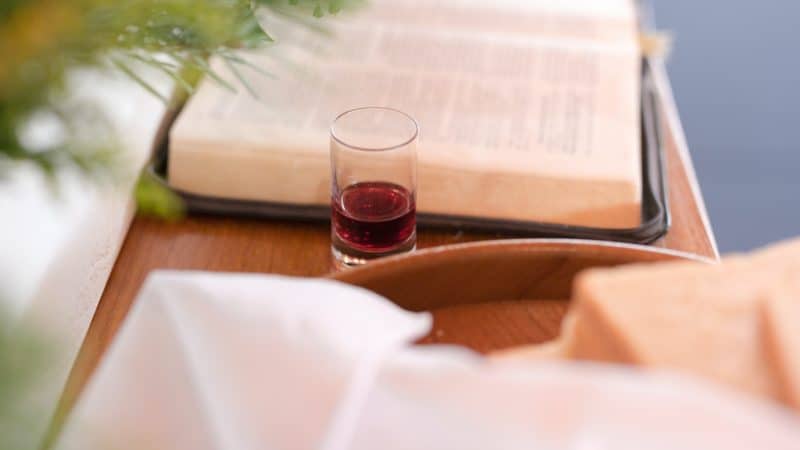
What is the Lord’s Supper?
The Lord’s Supper, celebrated today as a communion service, is an opportunity for believers to honor the gift of God in the sacrifice of Jesus Christ. In doing this, the apostle Paul writes, “You proclaim the Lord’s death till He comes” (1 Corinthians 11:26, NKJV).
The Lord’s Supper follows the words of Jesus Christ during the Last Supper He ate before His crucifixion, as detailed in the New Testament gospels. He and His disciples came together to celebrate the Passover meal, in remembrance of Israel’s deliverance from slavery in Egypt.
This time, however, as they partook of the unleavened bread and fruit of the vine, Jesus gave new meaning to these items.
And even before they ate together, Jesus demonstrated His love for His disciples and humanity by performing a servant’s job. He washed His disciples’ feet. By doing this, He showed an example of kindness and unconditional love.
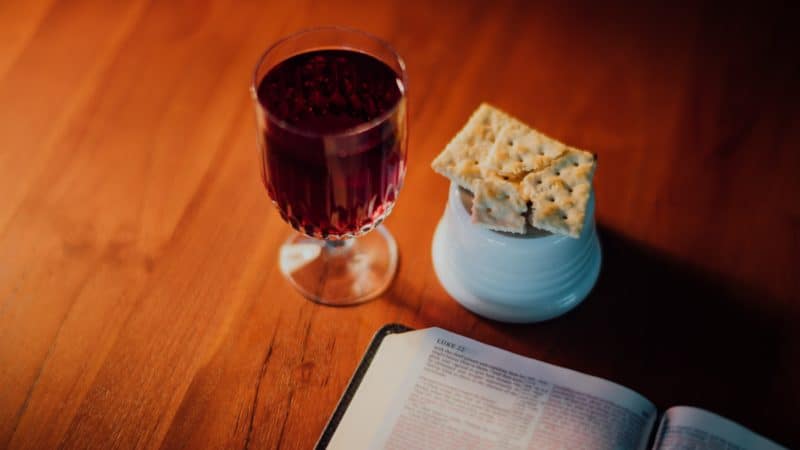
Symbolism of the emblems and ordinances of the Lord’s Supper
The three significant parts of a Seventh-day Adventist communion service involves eating unleavened bread, drinking grape juice (fruit of the vine), and washing one another’s’ feet. All these things are symbolic of Christ’s sacrifice to save us, and the humble, servant-like example He set.
These actions follow Jesus’ words to His disciples,
“Do this in remembrance of Me” (Luke 22:19, ESV).
Unleavened bread—Jesus’s body
The bread represents Christ’s body, broken for us. Matthew writes,
“And as they were eating, Jesus took bread, blessed and broke it, and gave it to the disciples and said, ‘Take, eat; this is My body’” (Matthew 26:26, NKJV).
He was standing before His disciples as He said this, communicating that this was to be a symbol of remembrance of what He was about to do..
“I am the bread of life,” Jesus said (John 6:48). He went on to explain,
“I am the living bread which came down from heaven. If anyone eats of this bread, he will live forever; and the bread that I shall give is My flesh, which I shall give for the life of the world” (John 6:51).
In giving His body for the world, God made a way for us to be saved from the eternal consequences of sin. By believing in and accepting Jesus’ death and resurrection.
Jesus, the true bread of Heaven, satisfies the deepest longings of our hearts.
“Your fathers ate the manna in the wilderness, and are dead,” Jesus told the religious leaders (John 6:49, NKJV).
The true bread of Heaven is not a sandwich. It’s not manna. This “true bread” symbolizes a spiritual nourishment to completely satisfy the soul hunger. Accepting Jesus Christ, the Bread of Life, will fill our hearts with meaning and love. Accepting Jesus will give us the assurance of eternal life in heaven with Him.
Why was the bread unleavened?
During the Passover, God instructed the Israelites to be ready to leave as soon as Pharaoh gave his consent.
“They baked unleavened cakes of the dough which they had brought out of Egypt; for it was not leavened, because they were driven out of Egypt and could not wait, nor had they prepared provisions for themselves” (Exodus 12:39, NKJV).
Through the years, as the Israelites celebrated the Passover, they used unleavened bread as a reminder of their hasty exodus from Egypt.
The Apostle Paul added additional meaning to eating unleavened bread at times of remembrance when he wrote to the Corinthian church:
“Do you not know that a little leaven leavens the whole lump? Therefore purge out the old leaven, that you may be a new lump, since you truly are unleavened. For indeed Christ, our Passover, was sacrificed for us.
Therefore let us keep the feast, not with old leaven, nor with the leaven of malice and wickedness, but with the unleavened bread of sincerity and truth” (1 Corinthians 5:6-8, NKJV).
Want to learn how Jesus can satisfy your soul and give you freedom, healing and hope? Sign up for our free online Bible studies.
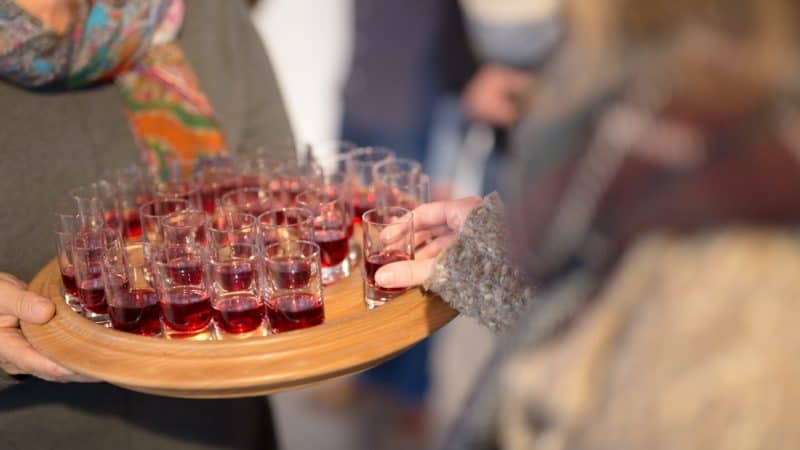
Wine, or grape juice—Jesus blood
The fruit of the vine symbolizes Jesus’ blood that was shed for us.
“This is My blood of the new covenant,” said Jesus, “which is shed for many for the remission of sins” (Matthew 26:28).
“Without the shedding of blood there is no forgiveness of sins” (Hebrews 9:22, ESV).
As with the bread, Jesus was standing before His disciples when He made the pronouncement, “This is My blood.”
Was the fruit of the vine fermented or unfermented?
Most Seventh-day Adventist Christians believe the fruit of the vine used in the Passover celebration was unfermented grape juice. After partaking of the cup, Jesus said,
“I will not drink of this fruit of the vine from now on until that day when I drink it new with you in My Father’s kingdom” (Matthew 26:29).
Above all, considering the ways fermented wine is often condemned in Scripture, Seventh-day Adventists seek to commemorate Christ’s sacrifice for us with a clear, unclouded mind.
“Wine is a mocker, Strong drink is a brawler, and whoever is led astray by it is not wise” (Proverbs 20:1).
“Do not look on the wine when it is red, when it sparkles in the cup, when it swirls around smoothly; at the last it bites like a serpent, and stings like a viper” (Proverbs 23:31, 32).
“But Daniel purposed in his heart that he would not defile himself with the portion of the king’s delicacies, nor with the wine which he drank; therefore he requested of the chief of the eunuchs that he might not defile himself” (Daniel 1:8).
Grape juice, freshly squeezed from the vine, is a fitting symbol of the perfect blood of Christ, shed for the redemption of mankind.
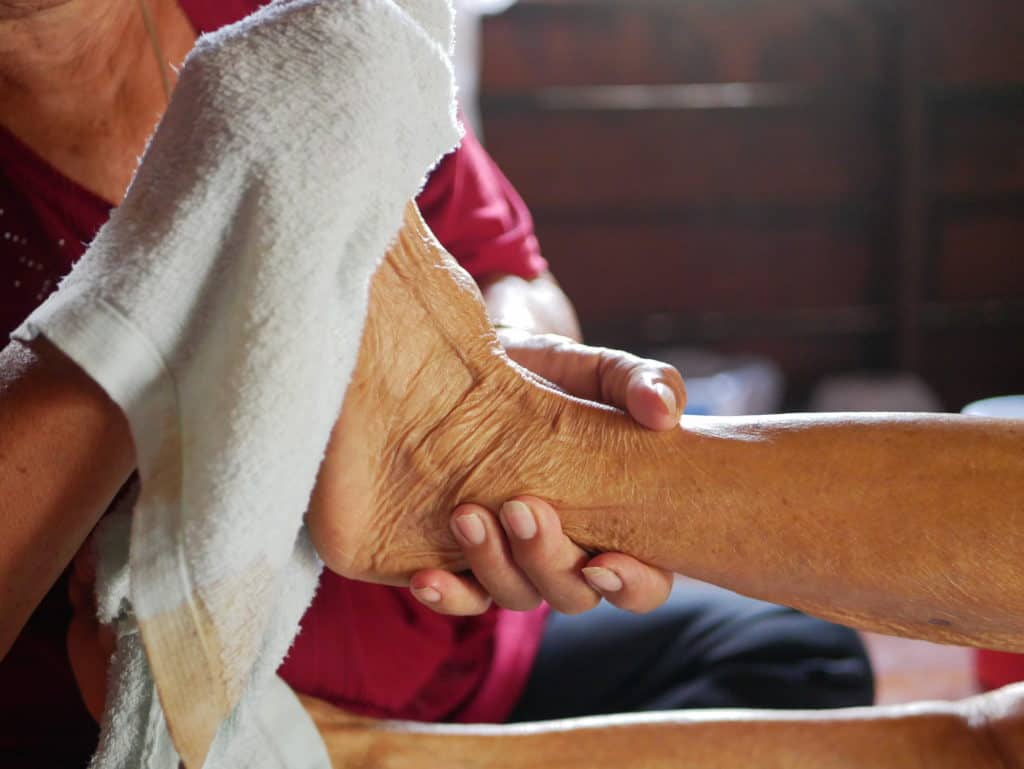
The “ordinance of humility,” or footwashing
The foot-washing service follows Jesus’ words and actions in John 13:
“If I then, your Lord and Teacher, have washed your feet, you also ought to wash one another’s feet. For I have given you an example, that you should do as I have done to you” (vs. 14, 15, ESV).
The disciples were taken aback at Jesus performing this humble service for them, which was normally considered a servant’s job. But in washing the feet of His disciples, Jesus gave us an example of true greatness.
During a communion service, most Adventist churches provide bowls, water and cloths for a ceremonial footwashing called the “Ordinance of Humility.”
This is a special time of fellowship, of putting aside differences in status, or position, serving our brothers and sisters in the faith, and making our hearts right with each other and God.
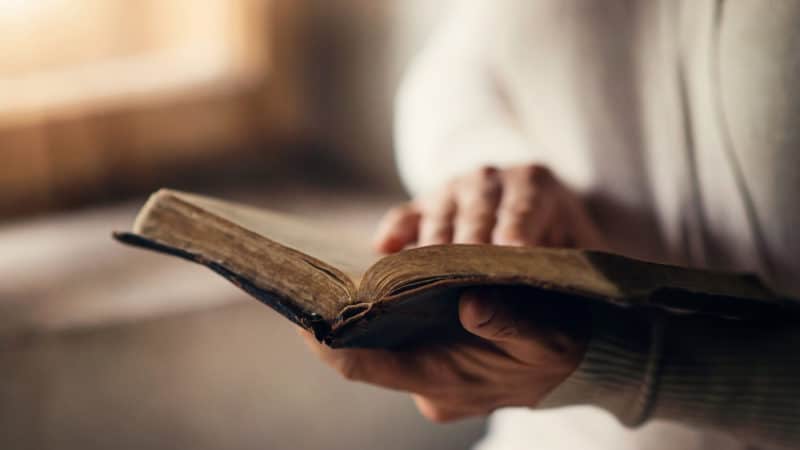
Does the Communion Service take the place of the Passover?
Jesus instituted the Lord’s Supper to commemorate our deliverance from the burden of sin. It is the new covenant service that continues the solemn celebration of the Passover.
Jesus and His disciples stood at the crossroads of two religious systems. For thousands of years, offerings of animals for sacrifice at the temple (Leviticus 6) represented a future event—what would happen to Christ. As innocent and perfect as a lamb, Christ came to make the ultimate sacrifice.
After His death, there was no more need for animal sacrifices. Our Lord Jesus came to earth to live a sinless life and be the perfect Sacrifice. He won the victory! He bore humanity’s ultimate consequences and made it possible for anyone to choose salvation through faith in Him.
During this last supper with His disciples, Jesus gave us an example. He broke bread and shared the fruit of the vine with His disciples and asked them to remember the sacrifice He was about to make for them—for all of us.
The Passover was a reminder of the deliverance of the Israelites from Egyptian slavery. The Lord’s Supper is a reminder of our personal deliverance from the slavery of sin. We have been redeemed, not with gold or silver, but “with the precious blood of Jesus Christ” (1 Peter 1:18, 19).
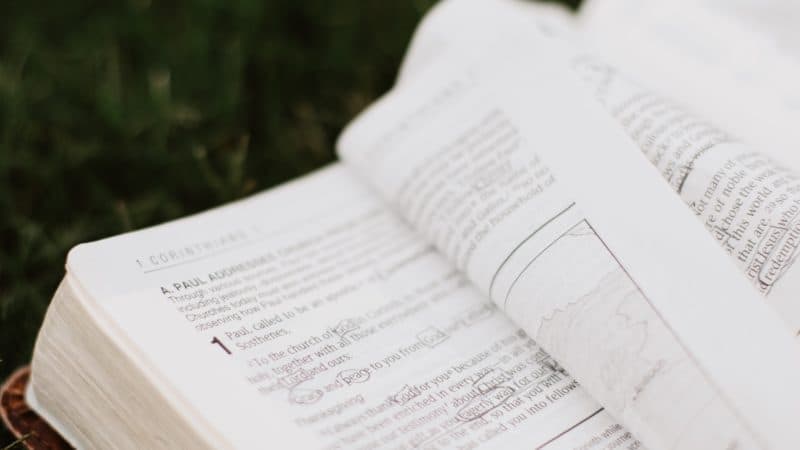
Preparing for a communion service
For a meaningful commemoration of Jesus’ sacrifice, Seventh-day Adventists follow the Apostle Paul’s guidance in 1 Corinthians 11 to prepare our hearts with self-examination (vs. 27). He cautions that “whoever eats this bread or drinks this cup of the Lord in an unworthy manner will be guilty of the body and blood of the Lord” (1 Corinthians 11:27, ESV).
While this verse feels stern, all Paul is pointing out is that this is a consecrated time of reflection to take seriously.
“But let a man examine himself, and so let him eat of the bread and drink of the cup,” he continued in verse 28.
Communion is the perfect time to be thinking about how we can grow in Christ and best honor Him with our lives. If we’re living in faith of what Jesus did and continues to do for us, He counts us as worthy. He wants us to joyfully celebrate the Lord’s Supper.
It’s a privilege to be part of this proclamation. Jesus, our Savior, has given the opportunity for salvation to every person. By His perfect life, His sacrificial death, and His resurrection, we are invited to come to His table, experience His love, and be saved for eternity.
Want to learn more from the Bible about what Jesus taught? Sign up for our Online Bible studies.

According to Thy Gracious Word
According to Thy gracious word,In meek humility,This will I do, my dying Lord,I will remember Thee.…
Read More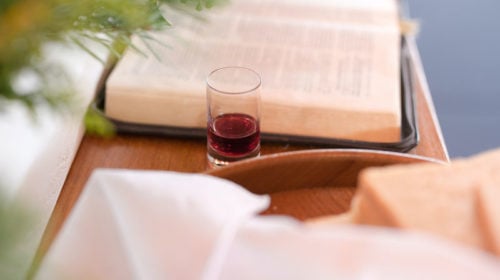
The Lord’s Supper: a Different Language
Throughout history, human beings have communicated with one another in ways other than the simple us…
Read More